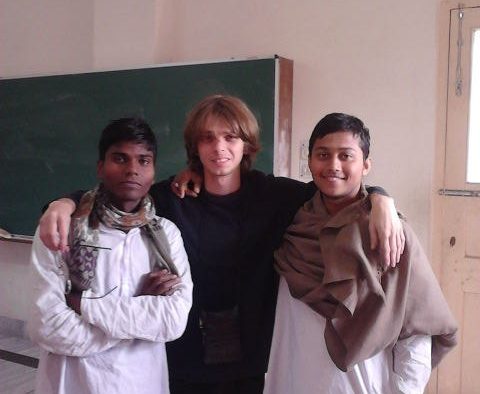Zahorulko Andriy of Ukraine was raised by parents who were interested in Indian philosophy long before he was born. Linguists, they hold PhDs and have translated many texts about Hindu philosophy and Hindu deities into different languages.
So Zahorulko’s interest in all things Indian is not surprising. With a childhood spent in Andhra Pradesh and West Bengal as his parents roamed around India doing research he was, “surrounded by things related to Indian culture. When I was about five-six years old I got interested in Indian mythology and languages; and what is definitely the foundation stone of Indian culture - Sanskrit! So in order to know more about the ancient culture of this great land I started learning its language. It was a combination of the interest towards Ancient India and her languages as a whole,” says Zahorulko.
In all he has spent 14-15 years in India, in Vishakapatanam and Durgapur, moving to Delhi in 2009. Zahorulko has not been to Ukraine since 2011, but says that as far as he knows, there is a great interest in Sanskrit both in Ukraine and in Russia, but there are only a few specialists in both countries. “I know that there are some courses in Kyiv, Kharkov and etc., but these are kind of private courses, not university courses. But I know that Sanskrit is learnt as a separate subject in one Russian university in Moscow (he has met one of their professors called Maxim Albertovich Rusanov). In some other universities this language is taught additionally in different courses like Indology, Hindi and etc. I know that there are courses of Sanskrit in the Indian cultural centre in Moscow as well. One thing is sure — there is a big interest! The problem of the Indian pandits is that most of them do not know foreign languages, otherwise they could come to our country and teach the people,” Zahorulko.
He can speak with great ease and felicity in Sanskrit. Having grown up listening to several languages by his linguist parents, he is in a position to compare. “This language is very scientific and logical, particularly because of Panini’s grammar, which is considered by the great linguists (western as well) as the most scientific grammar in the world. I like the fact that this language is in many ways similar to my native language (for example there is no exact word order both in Sanskrit and in Russian, unlike in German and in English, where you cannot start the sentence as you want, there are certain rules). Besides, there are many great books written in Sanskrit in different fields (from grammar to philosophy and architecture). A person who is able to grasp Sanskrit has the opportunity to read these books, to enjoy the poems of Kalidasa and gain the knowledge from the books related to some special subject.”
The texts that are popular among his peers outside India are those associated deeply with Sanatana Dharma. “I can say that people are interested mostly in some kind of religious and philosophical books, Bhagavad-Gita is very popular for example. People want to know more about Advaita, neo-Advaita, Vaishnavism, Indian gods and Indian mythology. Vedas and different commentaries to them also draw attention. Some people are interested in Indian literature. Unfortunately most of the people have no interest in grammatical works like सिद्धान्तकौमुदी, भूषणसारः, महाभाष्यम्, which I myself find very interesting and useful,” says Zahorulko.
Learning Sanskrit is surely not easy, but very interesting, he says, stressing that the most thing is to find a good guru. “I am really grateful to all my gurus, who helped me in learning the shastras; it would be difficult to remember each and every person who has taught me, but I would like to mention at least two of my व्याकरणम्-teachers — Ashok Kumar Mishra and my current guide — Madhukeshwara Bhatt, both from Rashtriya Sanskrit Sansthan. The second thing you need to learn Sanskrit properly is the ethic of working hard. You need to spend many hours to understand even one of the almost four thousand sutras in अष्टाध्यायी — Panini’s most prominent work,” says Zahorulko.
Zahorulko is interested in Indian history too, because “because it is very ancient and full of amazing facts and developments. I like Indian temples, their architecture, especially the ancient temples of the South. I spent my childhood in Andhra as I already mentioned, so in some aspects South India (and West Bengal as well) is like my second motherland. That is also the reason why I really like South Indian cuisine - dosa and idli are my favourites.”
It cannot be very easy for a person from Ukraine or Russia, used to freezing winters, to be able to adapt to the heat of New Delhi. “For some people it is impossible to live in hot weather, they like snow and coldness for example. I personally think that staying in India has more advantages than disadvantages - people are good here, life is not as expensive as in Russia and in western countries, I like Indian food and culture, I feel safe here, etc. One of the biggest disadvantages (this refers to Delhi first of all) is the pollution (especially in winter time), but as a whole I like the life here and I do not want to go somewhere else,” says Zahorulko.





